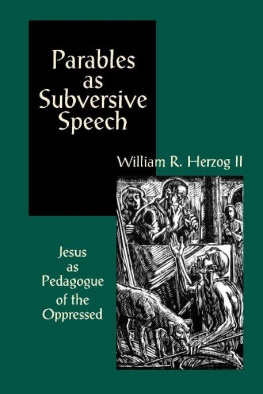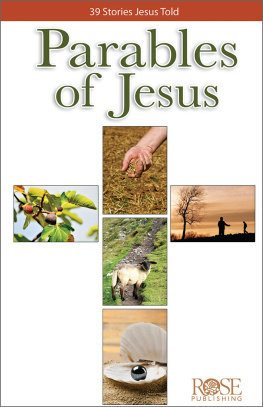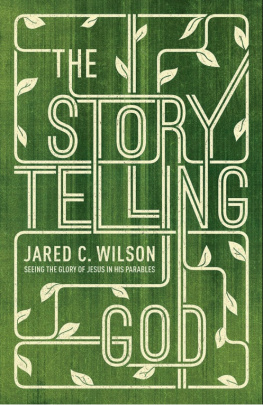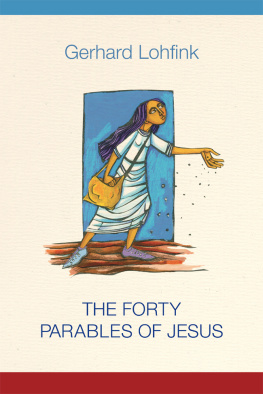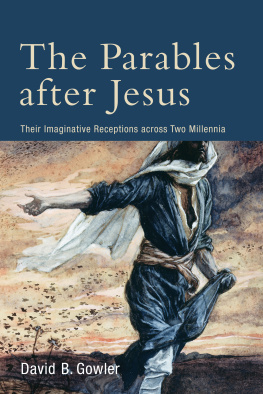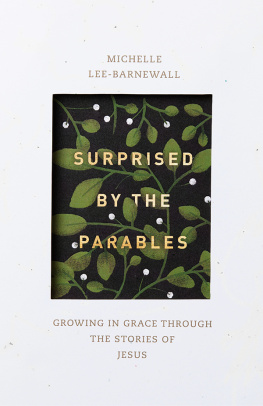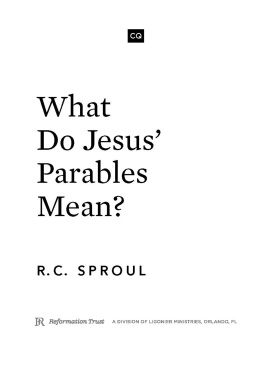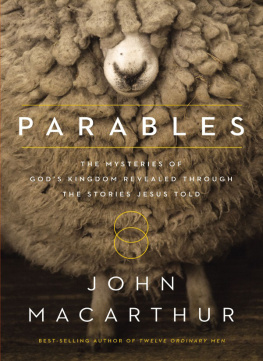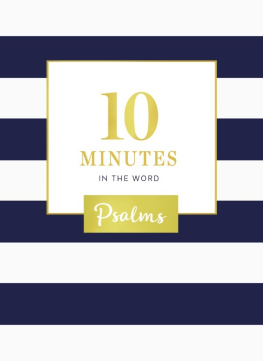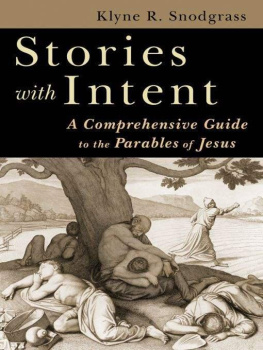Parables
as
Subversive
Speech
Parables
as
Subversive
Speech
William R. Herzog II
Jesus
as
Pedagogue
of the
Oppressed

1994 William R. Herzog II
All rights reserved. No part of this book may be reproduced or transmitted in any form or by any means, electronic or mechanical, including photocopying, recording, or by any information storage or retrieval system, without permission in writing from the publisher. For information, address Westminster/John Knox Press, 100 Witherspoon Street, Louisville, Kentucky 40202-1396.
Scripture quotations from the New Revised Standard Version of the Bible are copyright 1989 by the Division of Christian Education of the National Council of the Churches of Christ in the U.S.A. and are used by permission.
Book and cover design by Susan E. Jackson
Cover illustration: The Parable of the Rich Man and Lazarus, woodcut, by R. F. McGovern, Narberth, Pennsylvania
First edition
Published by Westminster/John Knox Press
Louisville, Kentucky
This book is printed on acid-free paper that meets the American National Standards Institute Z39.48 standard. 
PRINTED IN THE UNITED STATES OF AMERICA
9 8 7 6 5 4
Library of Congress Cataloging-in-Publication Data
Herzog, William R., date.
Parables as subversive speech : Jesus as pedagogue of the oppressed / William R. Herzog. 1st ed.
p. cm.
Includes bibliographical references.
ISBN 0-664-25355-5 (alk. paper)
1. Jesus ChristParables. 2. Jesus ChristPolitical and social views. 3. PalestineHistoryTo 70 A.D. 4. PalestineSocial conditions. I. Title.
BT375.2H44 1994
226.806dc20 93-44987
Contents
The Parables of Jesus, the World of the Parables,
and the Pedagogy of the Oppressed
1. The Parables of Jesus, the Reign of God,
and the Pedagogy of the Oppressed
4. The World of Agrarian Societies
and Traditional Aristocratic Empires
Unmasking the World of Oppression:
Posing the Problems
5. Blaming the Victims of Oppression:
The Parable of the Laborers in the Vineyard (Matt. 20:116)
6. Peasant Revolt and the Spiral of Violence:
The Parable of the Wicked Tenants (Mark 12:112)
7. The Unbridgeable Chasm:
The Parable of the Rich Man and Lazarus (Luke 16:1931)
8. What If the Messiah Came and Nothing Changed?
The Parable of the Unmerciful Servant (Matt. 18:2335)
9. The Vulnerability of the Whistle-blower:
The Parable of the Talents (Matt. 25:1430; Luke 19:1127)
Opening Up New Possibilities:
Challenging the Limits
10. The Deviant and Prominent Toll Collectors:
The Parable of the Pharisee and the Toll Collector (Luke 18:914)
11. The Moral Economy of the Peasant:
The Parable of the Friend at Midnight (Luke 11:58)
12. Justice at the Gate?
The Parable of the Unjust Judge (Luke 18:18)
13. A Weapon of the Weak:
The Parable of the Dishonest Steward (Luke 16:19)
For Mary, Daniel, and Catherine
Acknowledgments
In writing this work, I was reminded constantly of my indebtedness to many people. The first and perhaps greatest debt is owed to the students who have participated in my seminars on the parables, which were offered at the Graduate Theological Union and the American Baptist Seminary of the West in Berkeley, California; Central Baptist Theological Seminary in Kansas City, Kansas; and Colgate Rochester Divinity School/Bexley Hall/Crozer Theological Seminary in Rochester, New York. In each location, I encountered eager learners who were willing to experiment with different approaches to the parables and to engage the problems they posed. As any teacher knows, we learn far more from our students than we teach them. In this regard, it has been especially pleasing to watch former students such as David Batstone, Bill Dols, and Ched Myers become colleagues and pioneers in using the social sciences to enrich their own original work.
I owe an equal debt to the clergy and laity who invited me to propose a new approach to the parables and explore its implications with them. We did this together in local churches, regional conventions, and national gatherings. It was in no small measure the interest and excitement of these folks that motivated me to keep working on this project at just those moments when it seemed that it would never be completed. Although the pastoral dimensions of this study are not addressed until the final chapter, these gatherings continually reminded me that these studies of the parables were intended primarily for the church as the people of God.
In numerous academic settings, I have been fortunate enough to find colleagues who have stimulated, challenged, and nurtured my work. I risk mentioning some, knowing that I may inadvertently omit others. I am especially indebted to Marvin Cheney, Robert Coote, J. William Countryman, John Donahue, Sandra Schneiders, Herman Waetjen, and Ann Wire, all of the Graduate Theological Union, who modeled diverse ways of interpreting biblical texts. Anyone who attempts to use the social sciences in biblical interpretation is indebted to Norman Gottwald, who was at the Graduate Theological Union during my early years there. His pioneering work The Tribes of Yahweh revealed the extraordinary possibilities of using the social sciences to interpret biblical texts. During my years at the American Baptist Seminary of the West, I was fortunate enough to work with George Cummings and Karen Tye, a theologian and an educator, respectively, who took an interest in this work and deepened it by exposing it to the riches of their disciplines and interests. As a seminarian at the same school, I was inspired to pursue further graduate work by the most gifted teacher I have ever known, Robert Laurin, then professor of Old Testament and now of blessed memory. In this same setting, I was introduced to Paulo Freire by an extraordinary campus minister, Daniel Statello, who was then pursuing his doctoral degree. His life ended prematurely and tragically, but his blessed memory continues to inspire.
Numerous colleagues in the Social Sciences and Biblical Interpretation Working Group of the Catholic Biblical Association have contributed to this work by sharing resources and their own work on projects different from this in scope and subject but similar in methodology. Most of them also attend the Context Group. I wish to acknowledge my special indebtedness to John Elliott of the University of San Francisco; Bruce Malina of Creighton University; Halvor Moxnes of the University of Oslo; Jerome Neyrey of the University of Notre Dame; Douglas Oakman of Pacific Lutheran University; John Pilch of Catonsville, Maryland; and Richard Rohrbaugh of Lewis and Clark College. Each has contributed to the perspectives informing portions of the present study, although none of them would necessarily agree with its method or conclusions.
In the course of my discussions, I have engaged many earlier interpreters of the parables, and although I often contend with them, I hope I have done so without contentiousness. I would not want my differences with them, even when stated sharply, to distract either from the debt I owe them or the respect I have for their work.
In addition, I have been fortunate to work with an editor, Harold Twiss, who has nurtured this project and made countless suggestions to improve it. He has been patient and perceptive. No one could ask more than he has provided, and I am grateful for his careful work. None of the defects that remain can be traced to his good work or to the influence of the many colleagues who have contributed to this study. They have improved this work beyond measure. The defects that remain are my responsibility alone.
Next page
